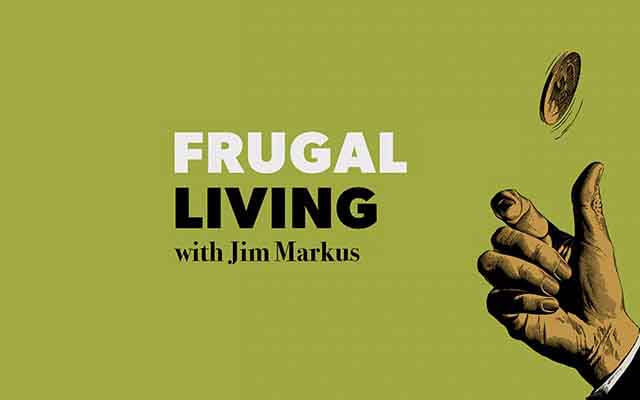Frugal Living: Why Do We Have Credit Scores?
[ad_1]
In this episode, Jim speaks with two qualified educators about credit history scores. Examine out Frugal Residing on Apple Podcasts, Spotify, Google Podcasts, Amazon, Anchor.fm, iHeartRadio, or anywhere you go to discover podcasts.

Our whole economic procedure relies on credit rating. But what does that imply for the typical shopper? What makes up a credit rating score? How do you preserve track and, just as importantly, how do you boost your credit rating? This week, we dig into people queries with two topic-make a difference professionals.
Learn A lot more About Your Credit Rating and Why We Use Them
Sean Trainor, an educator who wrote on the subject matter for TIME, to start with aids us recognize the heritage of fashionable credit rating reporting. He talks about the origins of our program (and why it’s the very best we have at the moment).
Then Angel Radcliffe, a money educator and organization strategist, breaks down a different prevalent subject: How to strengthen credit history scores. Her assistance? Pull your personal credit score, read your report, and understand what comprises your rating.
Want to listen to the complete present? Check out it out on Apple Podcasts or Spotify. We also have a entire transcript under.
Read a Transcript From This Episode
Jim (00:03):
This is Frugal Living.
Sean (02:14):
The greatest place to start off is to feel about how credit score loans and debt labored for most of human background. Which is basically in advance of anyone made a financial loan, they would inquire all-around about the particular person they have been preparing on loaning dollars to, and they, you know, would check out to uncover out if this human being experienced the income to repay the debt in the upcoming. And if they were being, you know, straightforward and, and possible to in fact repay that debt. But by the 19th century, as the business landscape, the economic landscape is obtaining far more and much more elaborate.
There’s a lot far more extensive-length trade, a large amount much more prolonged-length lending, essentially monetary institutions want details about prospective creditors that can be shared at great distances. And so, at the very least initially, there’s, there is an hard work in the U.S. mostly focused on business lending to obtain information about collectors. And originally this is just, you know, these huge books exactly where these providers initially termed, like, the Mercantile Company Bradstreet Enterprise, they are just jotting down rumors and rumour about people all above the nation.
Sooner or later there are efforts to make that info about likely creditors far more actionable and much more quickly legible, proper? So if you just have, like, a guide that, that records a bunch of rumors about people, that does not essentially enable loan providers determine out who they must and should really not loan dollars to. And so, at the very least at first, there are some very simple rating units that try out to codify this assortment of rumors into, you know–Basically like letter grades. Like, “A, ok, this person’s a secure wager, go forward and lend them funds. You are most likely to get it again. This person’s an F. You know, do not mortgage them income. You’re not possible to get it again.”
Which is kind of the, the deep origins of credit scores there. Nowadays there would not be any kind of innuendo that requires to be deciphered or, or even made in the first place. It’s seriously just a range and folks are not reading into that details to consider to discern one thing about the person’s character. It’s just a selection on the screen. If it is a superior range, financial establishments, you know, are far more probably to make the bank loan. If it is a low amount, they are, they are considerably less very likely. So it introduces a great offer more distance involving the loan company and the human being making use of for credit rating. The algorithm absorbs the activity of, of judgment in a perception, which earlier would have been taken on by the fiscal institution or, or the loan company.
Like so several things about present day modern society, it is a layer of length between social relations that ended up not there before. On the one particular hand, the credit rating rating is much less, kind of, nakedly moralizing than it applied to be. There’s a good deal of ethical judgment baked into people notes. And the, the amount strips that away. It also signifies that your economic identity–which is a expression that I’m borrowing from the historian, Josh Lauer, who’s written a good reserve on the matter of credit worthiness and credit history scoring–that your economical identity is much more portable, suitable? You do not need to have to, you know, call some credit history ranking agency and have them send above a bundle of notes to a prospective loan company. You just, you, you have acquired this score. Any person can search it up.
And so that is very good. Of training course, it’s also potentially lousy. If you do have a undesirable credit rating score, it, it form of follows you everywhere you go. So, you know, the actuality that it’s significantly less moralizing, the point that it is transportable, the simple fact that there’s some degree of objectivity, these are all beneficial points. The reality that, you know, it is so really hard to escape poor credit history, that the credit history score is dependent on facts that’s mainly produced by a, a society that consists of biases and methods of oppression, and is hence by itself compromised by that supply of the facts, these are all damaging items.
So even, you know, all these years immediately after composing this, this short article and, and owning thought about the matter of credit history reporting on and off for these many years, I’m however not seriously absolutely sure exactly where, wherever I stand. I necessarily mean, there are issues that are profoundly invasive about the present day procedure. But I can not convey myself to say that this is in any way even worse than obtaining your neighbors form of compile rumors about you and for that reason be judged on that foundation.
Jim (06:43):
This episode, as normally, was introduced to you by Brad’s Discounts. There is a group of men and women below scouring the internet for the best discounts on almost everything. The web page is B R A D S D E A L S.com. Just one trick for offer hunters: You can sign up for the Brad’s Bargains e-newsletter. That way, you’ll have a improved probability of snagging a thing stellar prior to it sells out. Thanks for listening.
Sean’s insight revealed the record of credit history reporting, and it served me take into consideration how I evaluated my have experience. It may not be a fantastic procedure, but it’s the program we have. And that delivers me to the future segment of our present. What do we have to have to know about credit score scores and credit rating studies? Now, Angel Radcliffe, a economical advisor and small business strategist, broke it down for me.
Angel (07:36):
I’d like to place out to start with that absolutely everyone is eligible to obtain a free duplicate of their credit report every single yr by visiting AnnualCreditReport.com or by examining with your bank or credit score union, credit score card corporation. Now, a whole lot of these economic expert services and organizations are presenting cost-free credit report.
There’s also Credit rating Karma, Credit Sesame that you can signal up for and receive that report and rating. But, you know, receiving to the facts in the genuine credit rating report, as soon as you pull it, you, you could request yourself, “Well, how did they compile all of this data?” And I convey to every person, you know, it’s crucial to recognize, one particular, most of it is your payment background.
But, two, items these types of as your particular data, where you function, your cellular phone figures, all of which is taken from your genuine credit application. So no matter what a consumer’s inserting on their credit score application, that is what is going to stop up in the credit rating report as considerably as current information. So, you know, there is so lots of unique sections inside the credit history report itself. There’s the personal information. You’ll see if you have any collections, community information this sort of as bankruptcies and repossessions and things of that character.
If you have been evicted, that reveals up on your credit rating report. So no make a difference if you have a great payment record, a very poor payment heritage, that exhibits on your credit score report. As very well as the credit history inquiries. And, you know, so several individuals really do not really spend interest to their credit history inquiry area or believe about, you know, the numerous moments that we’re out procuring. We’re in the shopping mall and you get prepared to check out. And they’re like, “Well, if you indication up for this credit history card, we’re gonna give you $50 off your buy.” And often, you know, we apply just to get the 50 bucks off. But we really do not recognize how that impacts our credit rating report and credit history score.
Credit inquiries stay on your credit rating report for two a long time. And it may well not seem to be like a prolonged time, you know. But if you are heading to buy a car or truck, a home, it is extremely critical to keep all those inquiries reduced due to the fact lenders may well start out to search at you like a possibility. If you have 20 inquiries, that means that you’re nervous for, for credit score. So it is essential to preserve all those minimal. And they really don’t acquire off too substantially of your rating, like, a person or two points listed here and there. But just about every inquiry, you know, that’s a couple more details that your rating is likely down. So it’s essential to regulate. Of system, you know, there’s so many extra information to comprehend as considerably as the balances, the balance history.
Normally credit experiences will have 7 yrs of historical past in your credit score report. Except if it’s a thing adverse, this kind of as a public file, all those stay for 10 several years. And, you know, I normally tell folks it’s so critical to look at your credit report, even if you are not a credit history person. Because I usually get people who say, “Oh, I do not do credit history. I do income.” Very well, what if someone’s gotten maintain of your id? They could have stolen your identity. Or a thing so straightforward such as, like, a cellphone monthly bill, or… I know now there are rental businesses that are reporting rental record to credit studies. You still will need to check out to make guaranteed the info is being claimed correctly.
All of these different components that we just got finished talking about, they actually make up little percentages of your score. And the most of that proportion is your payment history. So, it’s so vital to make absolutely sure, a person, you’re paying out your charges on time.
Two, the creditors are executing their thanks diligence and reporting on time. And then comprehension your utilization. So how considerably credit history are you applying versus the credit score that you are extended? It’s critical to maintain your credit score utilization under 30%. So that is the most popular selection and that is whole credit history utilization for all of the credit that you have extended. So if it is a line of credit rating or a credit history card, you wanna make certain that you’re trying to keep it down.
But specifically, you know, for a single account, due to the fact it will definitely limit your capacity to have individuals credit history line boosts. Or, you know, at the time you do pay back your equilibrium down, that creditor may perhaps look at you like a danger and they may perhaps mark you as carrying a superior stability about time. So preserve that in buy simply because the utilization impacts your score by 30%. So say for anyone who has excellent credit score, they have a 750 credit history score. And all of a sudden they are maxing out their credit. You could possibly see that credit history score tank and obtaining the 6 hundreds. And you don’t understand why. And it is since, you know, your utilization.
You can pay back your charges on time all you want and hold inquiries lower. But if you are starting up to max out your credit rating, you’re gonna see your rating start off to go down. And then, the other three components are actually the length of your credit score background, your credit rating combine, that means that you have a variety. So you could have a automobile bank loan, a home finance loan, a line of credit score, or credit card. Looking at that you have diverse kinds of credit history impacts, but it’s smaller, only 10%. And that is as very well as, like, the new credit.
So, I constantly notify people today make positive that you are shelling out consideration to all of people factors, primarily the two most critical, payment record and credit score utilization. So there’s 5 variables when calculating your credit rating rating. There is your payment historical past, the credit score utilization, or the amount that’s owed, the duration of credit heritage, new credit rating, and your credit score mix. All 5 of those people elements genuinely make up if you have fantastic credit score or terrible credit history.
Jim (12:42):
So I requested, “What’s the most significant thing folks forget in regards to their credit history?”
Angel (12:47):
The to start with detail that men and women are not executing or overlooking, men and women are not pulling their credit history report. And, you know, as I described before, there are some individuals who dislike credit score. And I often tell anyone credit history is so vital. And some persons will say, “No hard cash is king.” Effectively, we can go several hours and hrs on that particular discussion and have that discussion. But it is always so significant to have that credit rating.
It impacts so numerous items in our lives or so quite a few locations, this sort of as, a person, your auto insurance plan. And if you’ve ever found when you apply for vehicle insurance policies, they check your credit history report. They wanna make certain that, ‘Hey, like, you are of great character, you have very good payment history.” And some men and women will talk to, “Well, why is that? What if I’m gonna pay out my coverage plan up for 6 months or for the 12 months? Why do these insurance businesses treatment?” Like, credit score is a element of our every day lives. Consider about when you go to implement for a task. Relying, yeah, if it is a superior-profile occupation, if it is a task in insurance coverage, money solutions, they are examining your credit history report. And so numerous persons don’t have an understanding of that.
And if you don’t have credit rating, it’s not a important challenge. But there are corporations who will be considerably less likely to hand you around a firm credit score card. They may surprise like, “Does this individual know how to control their credit history or pay back their bills on time?” For the reason that there are, believe that it or not, there are some organizations who place that responsibility in the employee’s hand to in fact fork out that bill vs . the company company accounting shelling out it.
So, it impacts our everyday lives. And, and some people just actually misunderstand that element of being familiar with you have to have some kind of credit and you have to keep track of it.
Jim (14:26):
So why couldn’t I get a modest bank loan for a modest car or truck? Angel nailed it. I didn’t have any credit heritage. I hadn’t manufactured any payments to everyone. I hadn’t opened any credit cards or developed any payment practices for any analysis. College student financial loans have been however in deferral.
It may appear to be abnormal, but my starched collar banker was hunting out for my ideal interest when she suggested a credit card. She was displaying me the most prevalent way to establish credit. Specific thanks to this week’s guests, Sean Trainor and Angel Radcliffe.
If you enjoyed today’s episode, you should depart us a assessment on iTunes. You can also find today’s show notes and a transcript of the episode at Frugal.fm. Today’s episode was edited by Genny Blauvelt. And I’m Jim Markus.
Far more About Frugal Residing With Jim Markus
Frugal Residing is a podcast for wise consumers. How do you invest less and get far more? The demonstrate, sponsored by Brad’s Bargains, attributes interviews, tales, tips, and tips. Jim Markus hosts year five, out now.
[ad_2]
Source backlink







